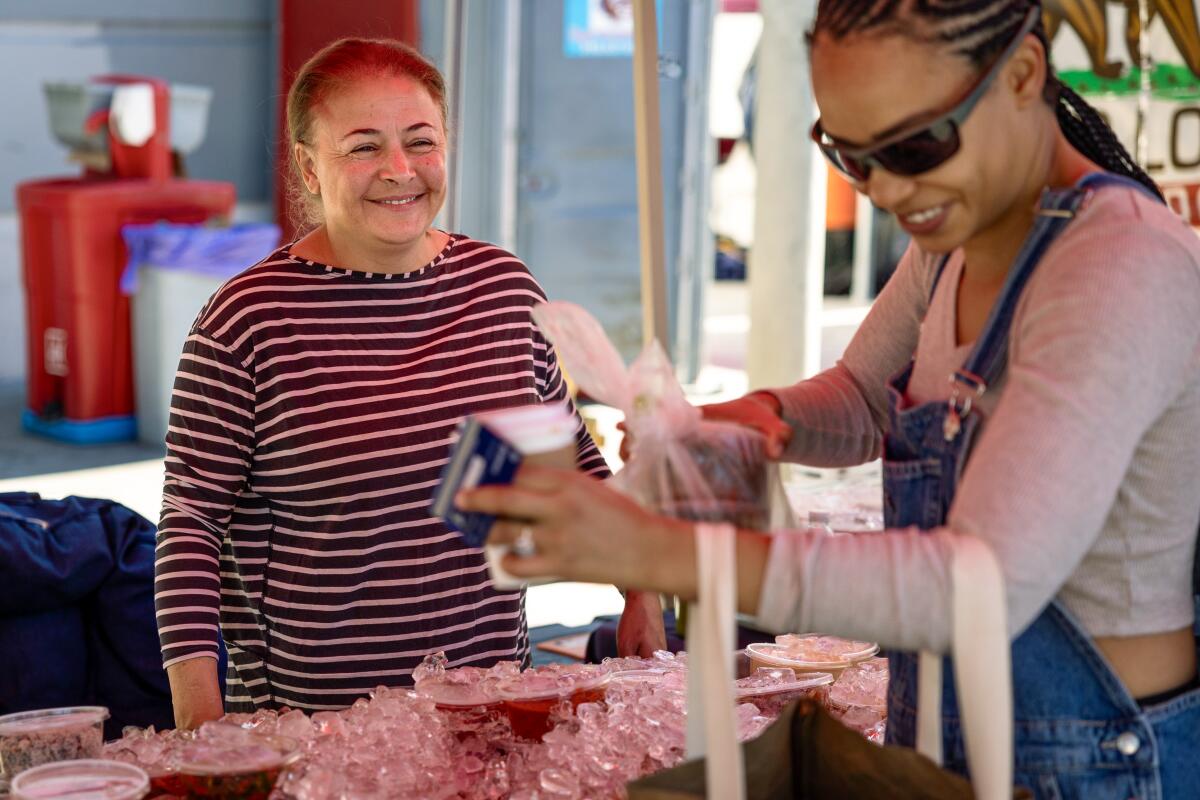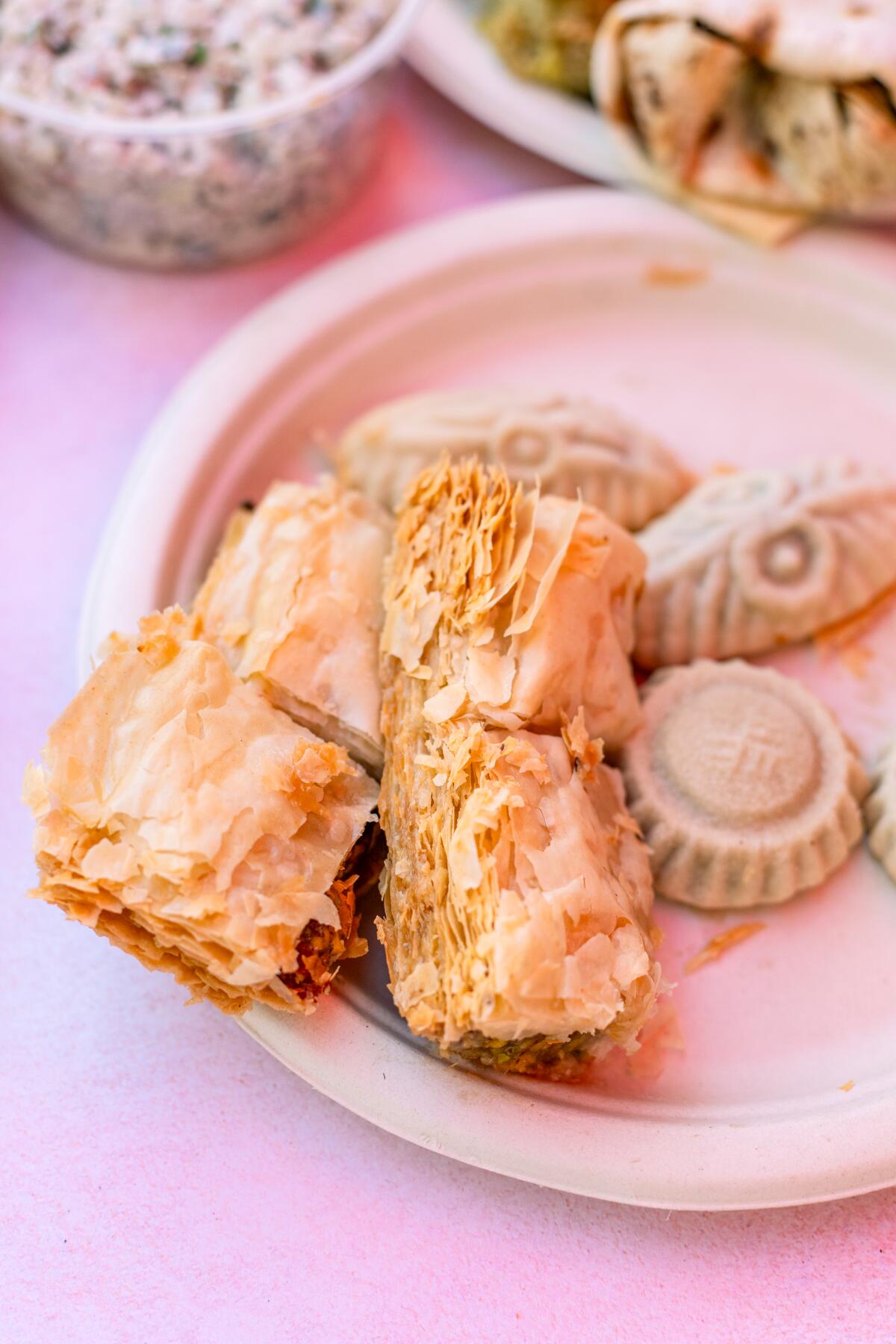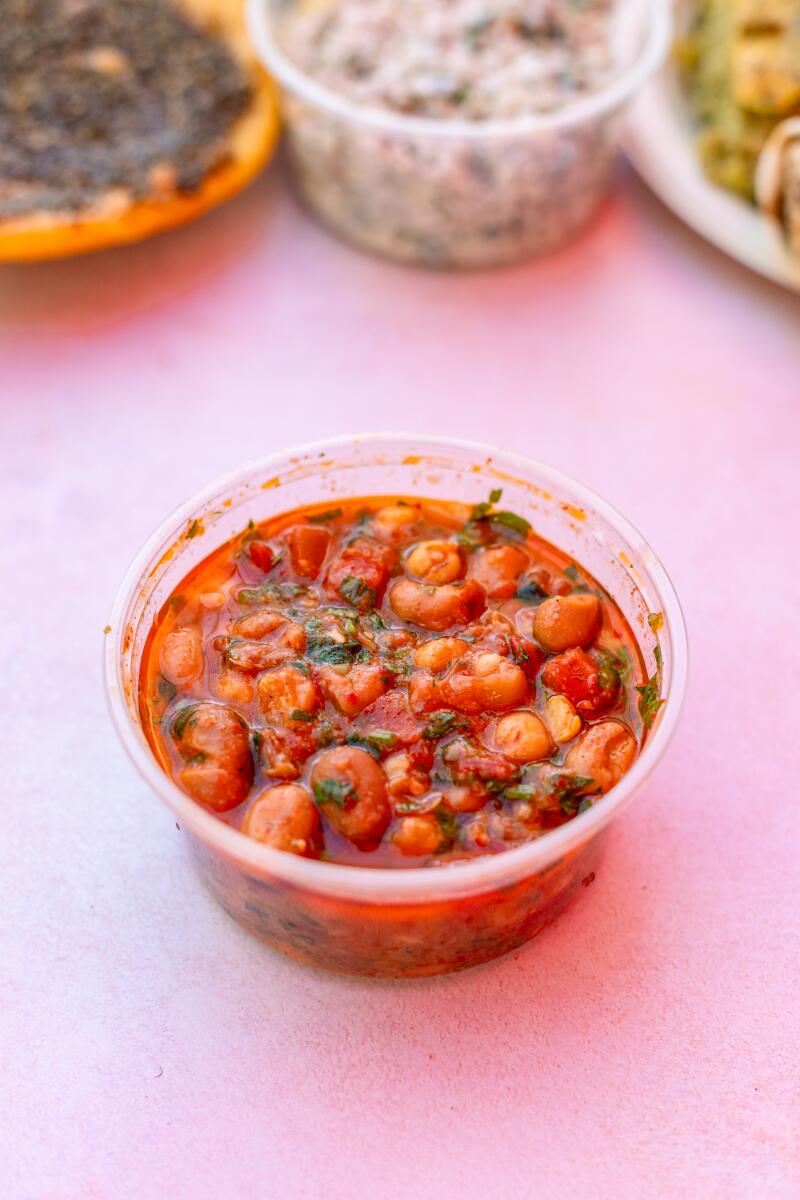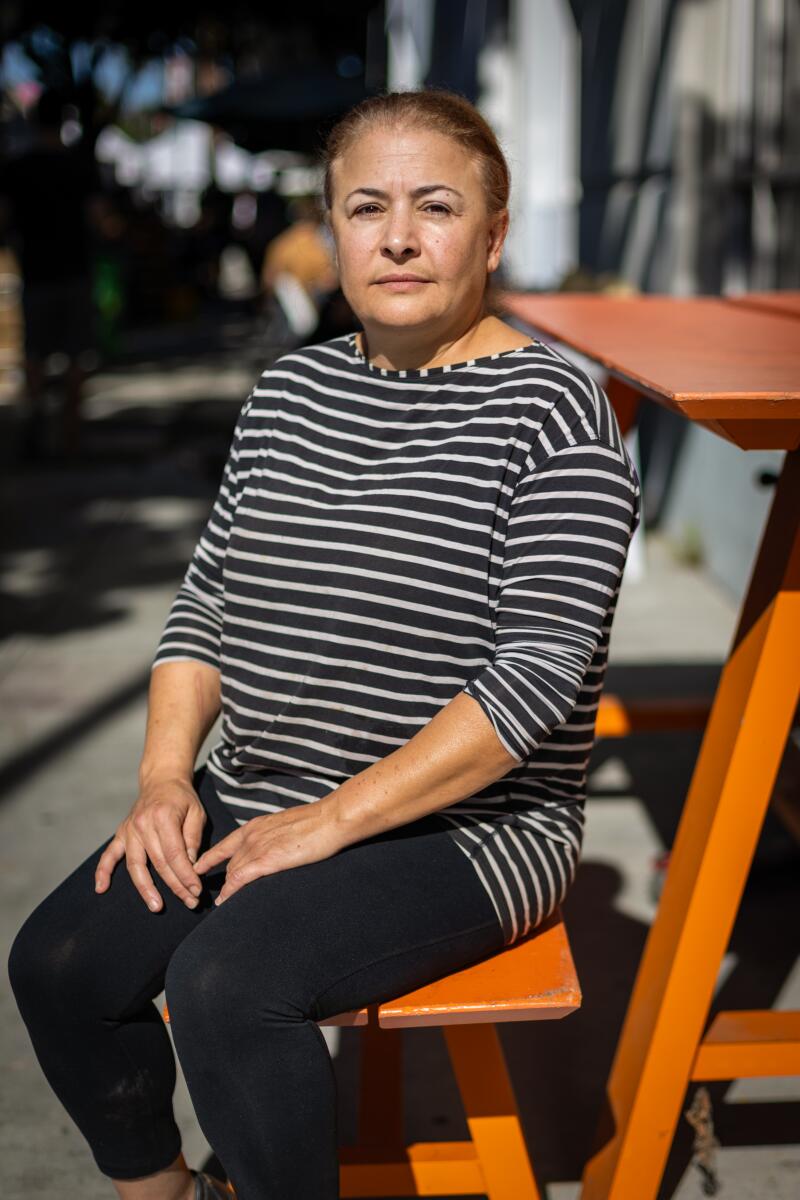A former revolutionary has a new mission: better representation of the Syrian table
[ad_1]
Nesrin had been pounding garlic all morning, but the pestle’s blunt thwack grew louder when she started talking about Syria. From 2010 to 2014, she marched in the revolution there. “Everyone conspired to kill the civil rights movement,” she said.
Nesrin (who asked not to use her last name to protect family still in Syria) now makes her living as a cook and an evangelist for Mediterranean cuisine. In an industrial kitchen in West Los Angeles, three olive-oil-drenched vegetable dishes stewed on the stove; she dumped the garlic paste into the green fava beans. Her cooking style is intense but never harried. In gold slides and a splattered green apron, her hair held back with a cloth headband, she fussed with each clay pot one by one, sprinkling the okra with cilantro, shaking kosher salt out of the box onto an eggplant tagine, and hitting all three with a dusting of Aleppo pepper.

“People sell things we don’t eat or know about in the Middle East,” says Mediterranean Pastries Den owner Nesrin. “There’s really no representation of the Syrian table, and the diversity of what we eat.”
(Jason Armond / Los Angeles Times)
Since 2019, Nesrin has operated a stand called Mediterranean Pastries Den at three Westside farmers markets: Mar Vista, Playa Vista and Hermosa Beach. I’ve been a regular at the Mar Vista farmers market for eight years. While there are plenty of vendors there who remember my face, Nesrin is the only one who knows my name and asks about my family. If my baby is with me, she will make him laugh and giggle while speaking Arabic in a high, silly register. She’s not a vendor — she’s a host.
In Southern California, Syrian food is clustered in Anaheim and the San Fernando Valley. Nesrin saw an opening in Los Angeles’ Westside, where there’s lots of enthusiasm for vegetable-forward eating but often without strong cultural context. “People sell things we don’t eat or know about in the Middle East. Hummus with avocado — we never eat hummus with avocado, absolutely not. There’s really no representation of the Syrian table, and the diversity of what we eat,” she said.
The name of her stand is a bit misleading. Her pastries are delicious — the baklava luxurious with pistachios and rosewater, and the date filling in her maamoul cookies strongly spiced with fennel and mahlab — but she is especially adept with vegetables, beans and whole grains.

But don’t skip the baklava with pistachios and rosewater, and her maamoul cookies with date filling, spiced with fennel and mahlab.
(Jason Armond / Los Angeles Times)
For her eggplant tagine, the eggplant is first fried and then stewed with onion, garlic and tomatoes; it’s rich and sweet and creamy, studded with whole cloves of garlic. She cooks chunks of okra gently, folding rather than stirring them to keep what she calls “the goop” at bay. A dish of Yemen-style ful she calls Yemeni beans is made of puréed favas stewed with garlic, tomatoes, cumin and turmeric.
The recipe for the ful comes from a family of diplomats from that country, who were Nesrin’s neighbors growing up in Damascus. Her father was a real estate developer, and the family traveled frequently to Europe and around the Middle East. Combined with living in the diplomatic quarter, this cosmopolitan childhood gave Nesrin a taste — literally — for a wide variety of cuisines.
In the late 2000s, she came to the U.S. to attend graduate school. Nesrin had to learn to pump gas, because before then, her family had always had a driver. When the Arab Spring began, she felt it was her duty to return home to help restore democracy. “It was time to help your country when you’re educated and equipped with democratic values,” she says.
She returned to the U.S., where she has family, as an asylum seeker, and now has a green card. Her dream is to open a restaurant. But the rents in West L.A., not to mention the tens of thousands of dollars needed for a build-out, have put that dream out of reach, at least for now.
While cooking for the week, Nesrin listens to the news and checks alerts on an iPad tucked into a soft, padded stand near the stove. When I visited with her on Oct. 5, she was scrolling through stories about Kevin McCarthy’s ouster as speaker of the House and despaired over the chaos in American democracy.

Egyptian beans at Mediterranean Pastries Den at the Mar Vista farmers market is one of owner Nesrin’s specialties. (Jason Armond / Los Angeles Times)

Nesrin’s dream is to open her own restaurant. (Jason Armond / Los Angeles Times)
We spoke again in November, and I asked her how the news about the Israel-Hamas war had affected her. After having seen so much suffering during the Syrian civil war, she said that in the conflict between Hamas and Israel’s right-wing government, “It’s difficult to see the civilians pay the price.”
Another one of the dishes she sells is a version of musakhan, sumac chicken baked with onions and spices, which Palestinian chef Reem Asil called “perhaps the most iconic of all Palestinian chicken dishes.”
It’s another recipe Nesrin learned from a neighbor, this one Palestinian, growing up. She follows the news in Gaza closely. She said, “I know of real people there, who have real families. I follow their stories. For me, I’ve been in this situation.”
The war has brought renewed scrutiny to the hoary cliché that food brings people together, and the intense, almost cruel pressure put onto, say, a bowl of hummus to humanize the people who made it.
Nesrin’s customers largely do not share her cultural background, but she’s not trying to prove anything about herself. Her mission is to address the flaws in American food culture, whether that’s an over-reliance on meat or the perhaps misguided practice of serving plain roasted vegetables. Many of her regular customers are families because kids love her okra and green beans, gently cooked and layered with flavor. I’m guilty of roasting my okra, a vegetable I didn’t grow up eating, and eating her food has taught me an entirely new appreciation of it. Which is the point. She says, “I want to teach the public about how you eat.”
[ad_2]
Read More:A former revolutionary has a new mission: better representation of the Syrian table

Comments are closed.